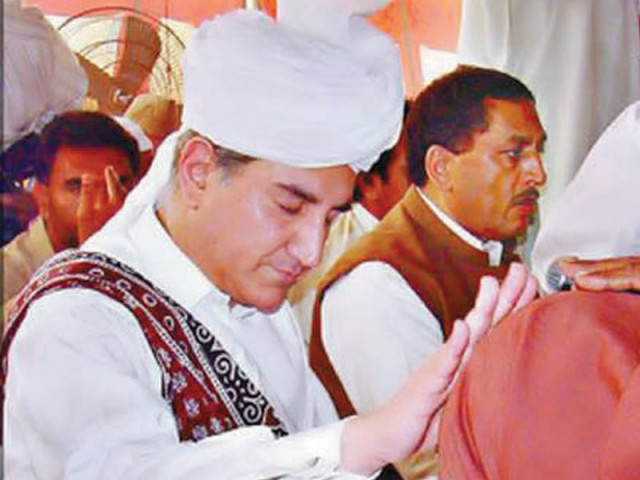Qureshi’s religious awakening: Sajjada Nashin orders his followers to reorganise themselves
He is the spiritual leader of the followers of Hazrat Ghous Bahauddin Zakariya.

The “Sajjada Nashin” of the murshid- his direct descendent, would nominate the local representatives of the jamaat, known as “khalifa” (caliph), who had an influential role in their communities. They used to visit their people and other places as well to spread the message of their saint and were involved in the matters of the people. The Sajjada Nashin would visit an area once a year and inquire his followers about their problems.
But now, this practice has virtually been discontinued. The caliphs are not active and neither do they work to mobilise the people.
Khalifo Faiz Muhammad lives in a village near Kambar Shahdadkot district. He was nominated as the caliph of Ghousia Jamaat almost a year ago when his father, Faqeer Soomar Khalifo, died. The former foreign minister, Shah Mehmood Qureshi, who is now the Sajjada Nashin, flew in to present Muhammad with a turban, the symbolic identity of the area’s chief caliph.
According to Muhammad, the jamaat still exists, but was not active because of socio-economic constraints. Poverty has increased and the people are now more focused on making their ends meet. “But we received a message from our spiritual leader [Qureshi] to reorganise the jamaat,” he said. “I will go and meet the people in our area after his rally in Ghotki.” Pakistan Tehreek-i-Insaf (PTI) held a rally on Sunday in which Qureshi announced to join it.
Muhammad said that most of the people in Sindh still follow Hazrat Ghous Bahauddin Zakariya and visit Multan every year for his urs.
“After Hur and Sarwari Jamaats, the Ghousia Jamaat has the most influence in Sindh,” according to Arbab Naik Mohammad, a Sindhi writer. Pir Pagara is the Sajjada Nashin for Hur Jamaat and Makhdum Amin Fahim for Sarwari Jamaat. Their “gaddis”- religious centres, are in Pir jo Goth and Hala. While the gaddi for Qureshi’s followers is in Multan, but the city used to be a part of Sindh till 1818, when Maharaja Ranjit Singh captured it. Hence, a large number of Bahauddin Zakariya’s followers are from Sindh. The writer said that although the caliphs of the jamaat are not active, but they still collect donations for langar (free food) served to the people at the shrine. The followers usually contribute a little amount for the langar during the rabi and kharif season. He added that Qureshi’s announcement to part ways with Pakistan Peoples Party will impact its vote bank in some districts.
“A few parliamentarians in Sanghar, Hyderabad and Tando Allahyar districts are diehard followers of Ghosia Jamaat, who were elected in the 2008 elections because of their personal influence in the community,” said Naik Mohammad. “They can support Mr Qureshi.”
Besides Tharparker, Sanghar, Tando Allahyar, Ghotki, Umerkot, Larkana, Kamber Shahdadkot, Shahdadpur, Mirpurkhas, Badin, Thatta and Jacobabad districts also have a large following of the Ghousia Jamaat.
Abdul Razzaque Rahimoon of the Pakistan Muslim League- Quaid-e-Azam (PML-Q), a member of standing committee on industries, commerce, mines and mineral development, seconded Muhammad’s statement. He belongs to Tharparkar district and majority of the people from his constituency, including him, are followers of the Bahauddin Zakariya.
“Around 80% of the people of Nangarparkar and Chachhro talukas of Thar district are devotees of Ghous Bahauddin Zakria and they will support Qureshi.” According to him, Qureshi recently called the former chief minister of Sindh, Arbab Ghulam Rahim- who also belongs to PML-Q, to garner support. “But the latter has not made any decision yet,” he said. “We will agree with whatever Dr Rahim decides.”
Ashgar Memon of Badin said that although his family was affiliated with Pakistan Peoples Party, but now they will vote for their spiritual leader, who is now in PTI. “You cannot imagine how happy the people are to know that Sajjada Nashin of Ghousia Jamaat asked them for support,” he said.
Many still believe that their murshid [saint] can resolve their everyday problems, added Memon. They visit his shrine in Multan for prayers and firmly believe that, no one else, but only thier murshid can heal their miseries.
Published in The Express Tribune, November 28th, 2011.


















COMMENTS
Comments are moderated and generally will be posted if they are on-topic and not abusive.
For more information, please see our Comments FAQ